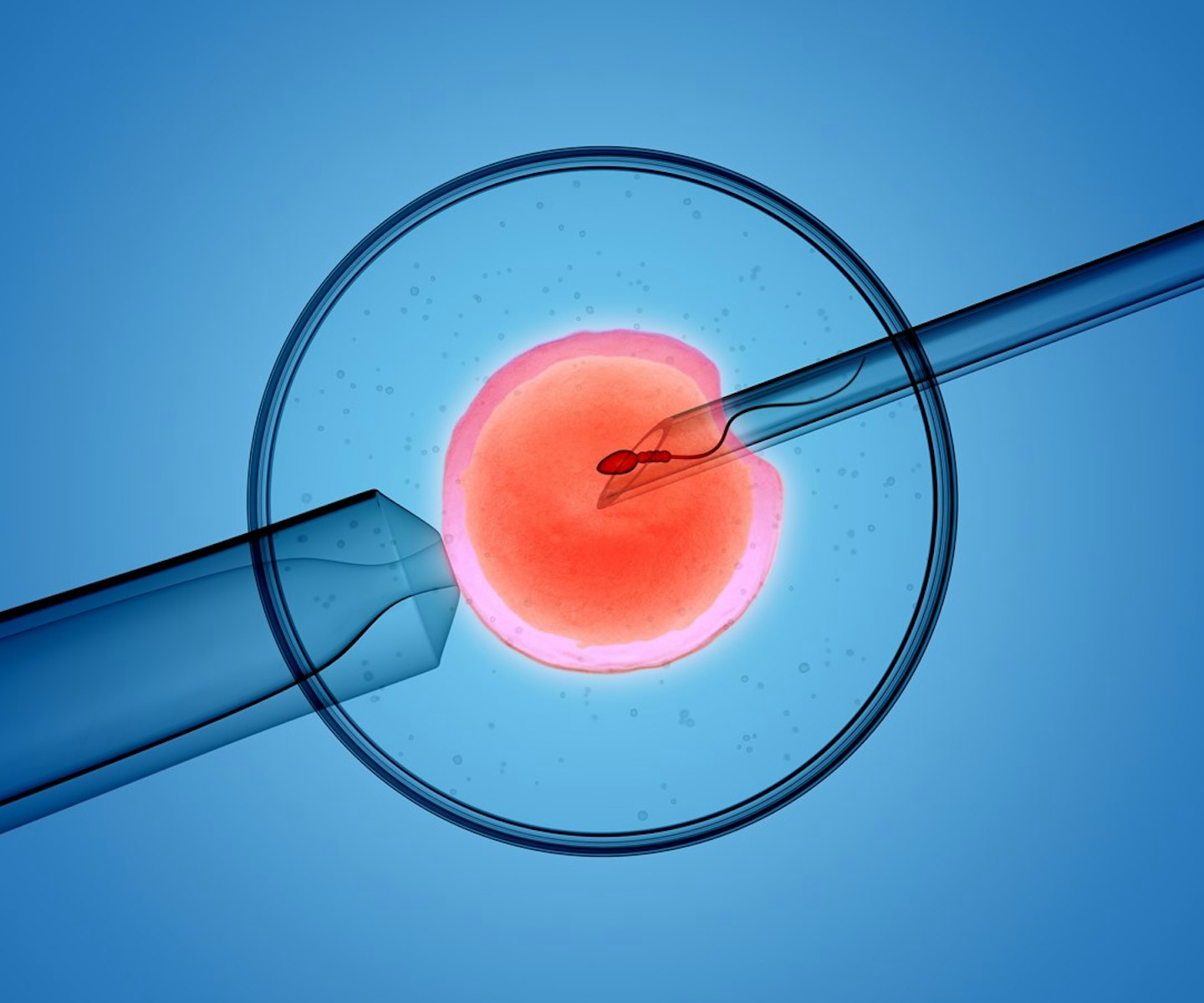There are lots of natural ways to improve your man's fertility, from eating sperm-count-boosting foods to taking folic acid supplements. We've gathered expert tips and advice on how to increase sperm count simply, naturally and effectively.
When you're trying for a baby, it's a two-way street. There are plenty of things your partner can do to help the conception process and increase his sperm count.
Unlike women, who are born with all the eggs they'll ever have, men are always producing new sperm. This means little changes to his diet and lifestyle can make a difference quickly.

How to increase sperm count
According to fertility expert and midwife Zita West, founder of the Zita West Fertility Clinic, if your man has a low sperm count, there are definitely a few swaps and changes that can help improve his swimmers...
Quit smoking
This is a biggie, it's been proven that smoking reduces sperm count by as much as 23%, so if you are trying for a baby, now might be the time to persuade him to quit. If he can't kick the habit, encourage him to seek advice and support. ‘Smoking depletes the body of vital nutrients for sperm production,’ says Zita.
You also don’t want to be bothered by his second-hand smoke fumes when you’re pregnant – or when you have a baby. It’s a win-win.
Cut down on alcohol
We're not suggesting he needs to say goodbye to a pint after work, but perhaps cut back on boozy nights out...
‘Research has found it takes couples less time to get pregnant when alcohol is taken out of the equation, but it’s difficult because conception times vary for different people anyway,’ says Zita. ‘What I’d suggest is limiting it to perhaps six units or less a week, and ditching binges.’
Make sure he's getting enough sleep
Whilst sleep might not directly be connected to sperm count, it's an important part of making sure his body is healthy, so ensure you're switching off early enough!
Keep masturbating
It may seem like he shouldn’t be doing this – the idea of wasting quality goods and all that – but regular ejaculation keeps sperm nice and healthy.
‘Sperm eventually dies if it isn’t released on a regular basis, which overall damages its quality,’ says Zita. ‘So, when you’re not having sex, it’s fine for him to masturbate.’ .
Be aware of lap action
It’s become almost a joke when people talk about conceiving, but having his computer on his lap all the time really does damage his fertility.
‘The reason his testicles are on the outside of his body is so his sperm stays cool, which keeps it effective,’ says Zita. ‘Laptops, saunas, hot tubs and even tight boxers cause overheating, which damages his sperm.’
Avoid certain medications
It's very important that your partner has a chat to his GP before stopping any course of medicine, but some prescription medications are known to decrease the healthy production of sperm.
These include some antibiotics, anti-androgens, anti-inflammatories, antipsychotics, corticosteriods, anabolic steriods, exogenous testosterone and methadone.
In most cases, once a person stops taking the drug his sperm will return to normal or increase, but it is worth checking with your GP if you have any worries.
Exercise
Exercise will keep him healthy and at a good weight, but it’s best not to overdo it. ‘Working out and keeping fit is beneficial when you’re trying to conceive but, again, it’s important for his testicles not to overheat,’ says Zita.
‘For that reason, I’d recommend he doesn’t sign up for a marathon or do anything too intense.’
Several studies on overweight or obese men have shown that sperm count increased when they lost weight, in some cases by as much as 95%.
Reduce stress
Easier said than done, but similar to women, stress can affect fertility. This is because when the body is stressed, it conserves energy and focuses on surviving, rather than reproducing. A healthy diet and exercise can be good places to start.
Passion, enjoyment and keeping the hormones surging when you’re having sex are all part of the baby-making process. So, if his mind’s elsewhere and racing with work worries, perhaps suggest he takes action to de-stress.
‘There are plenty of relaxation techniques he could try, such as meditation,’ says Zita.
Think about his diet
A nutrient-filled diet makes all the difference to producing healthy baby batter. ‘Encourage him to steer clear of processed food,’ says Zita. ‘Fresh fruit, veg, meat and fish should be on the menu, as they contain fertility-supporting nutrients including lycopene, amino acids and Vitamin D.’ Ensuring he gets enough folic acid can help, too.
Another reason to watch what he eats? Being overweight can also cause his testicles to heat up.
A low sperm count has often been linked with a zinc deficiency or a lack of essential vitamins. So, making some food changes can be a clever way to increase your partner's sperm count. That’s why we’ve put together a list of foods you definitely need to get on his 'Trying To Conceive' menu...

8 foods to increase sperm count
Add these foods to your baby-making menu to boost your chances of conceiving:
Oysters for sperm production
Oysters are one of your man’s best sources of zinc, which helps sperm production. An added benefit is that they are also an aphrodisiac, so load him up with 15mg a day – around 50g of oysters – and you’ll be making babies before you know it! If your wallet – or his stomach – can’t stretch to that much, other great sources of zinc are turkey, pumpkin seeds, lobster and mussels.
Dark chocolate for antioxidants
Dark chocolate contains an amino acid that has been proven to double sperm and semen volume. It’s also high in antioxidants – enough to rival pomegranates and acai berries. Antioxidants are a great weapon against free radicals, nasty little molecules found in pollution and toxins that are linked to male infertility. But don’t go overboard – putting on weight can cause imbalances in testosterone which could lower your man’s sperm count. A couple of squares a day is plenty.
Garlic for sperm motility
If the strong aroma doesn’t put you off doing the deed, garlic is a great baby-making booster for your man. It contains two magic elements – allicin, which improves blood flow to his sexual organs and protects sperm from damage, and selenium, an antioxidant that improves sperm motility. One to two cloves a day is a good amount.

Bananas for libido
Bananas have been found to increase male libido and regulate sex hormones because of an enzyme called bromelain. They’re also full of vitamins C, A and B1 which will boost his body’s ability to produce sperm.
Broccoli for upbeat swimmers
Deficiencies in vitamin A are a common cause of low fertility, because a lack of vitamin A makes your man’s sperm sluggish. Broccoli is packed with vitamin A, as are red peppers, spinach, apricots, sweet potatoes and carrots.
Asparagus for volume
Asparagus is another weapon against those nasty free radicals. It’s also packed with vitamin C, which protects sperm from damage and increases its motility and volume – so your man will have more swimmers and they’ll move faster.
Walnuts for sperm count
Omega-3 fatty acids increase sperm count and boost blood flow to the genitals – and walnuts are a fantastic source. They’re a tasty on-the-go snack, and can be sprinkled on cereal or dessert. Other good sources of omega-3 fatty acids are crab, salmon, chicken and pumpkin seeds.
Ginseng for testosterone
This aphrodisiac root has been used to treat infertility for hundreds of years. It boosts levels of testosterone and increases blood flow to the genitals, with some claiming it even treats erectile dysfunction. Get your man to drink tea with ginseng, or take dried ginseng root each day for a TTC boost.
What foods should men avoid to boost sperm?
The majority of these foods to avoid aren't particularly surprising – the main thing is to eat and live as healthily as possible when trying to conceive. So, everything in moderation and maybe hold off the drive-through binges until after you're knocked up.
1. Processed meats
Several studies connect eating processed red meat with decreased sperm counts and altered sperm motility. Men who eat a 'Western' diet high in processed and junk foods like pizza, red meat, and chips have lower sperm counts than men who eat diets with fewer processed foods.
2. Trans fats
Researchers are primarily concerned about trans fats increasing the risk of heart disease. Unfortunately, the concerns don’t stop there. An increased intake of trans fats has also been linked with decreased sperm counts.
3. Soya/soy products
Soya products contain phytoestrogens—estrogen-like compounds that come from plants. The idea that soy affects male fertility is not new, and there is a growing body of research on it. However, the NHS advice is that so far there is little consensus from the studies as to the true relationship between soy and male fertility. Although soya is unlikely to make healthy men infertile, it could have a significant effect on men who already have lower-than-average sperm counts.
4. Pesticides and bisphenol a (BPA)
Both BPA and chemicals within pesticides act as xenoestrogens—chemicals that mimic estrogen. Just like the phytoestrogens in soy, xenoestrogens can wreak havoc on sperm concentration.
This one is tricky to avoid as there are traces of pesticides in most of the food we eat, and BPA from the packaging it is in. To reduce any impact this may have on sperm count, you can shop locally. Buy meat and fish from your butcher/fishmonger, and your veggies from the market – they won't be sat in plastic and are more likely to have come from smaller producers who cultivate more organically.
If you'd rather stick to the supermarket, look out for organic produce (but be warned that organic doesn't mean no pesticides), wash your fruit and veg before eating it, and get into the habit of removing unnecessary plastic packaging when you're unpacking your shopping.
5. High-fat dairy products
Studies have suggested that dairy is a possible risk factor30426-6/pdf){href='https://www.fertstert.org/article/S0015-0282(18)30426-6/pdf' } for a reduced sperm count, more research is needed but the evidence largely upholds the benefit of low-fat versus the harmful effects of full-fat dairy products.
Do herbal supplements actually work?
As with any herbal remedy, research on fertility herbs and supplements is limited, but there are certain names that pop up when looking into fertility.
Vitamin D and calcium serum have both been found to impact sperm health. Studies suggest that vitamin D may boost testosterone levels. Many men also choose to take fertility supplements to boost their chances of conceiving.
Fenugreek is a herbal remedy linked to poor sperm health. You may think of fenugreek as a culinary herb, but it also has a wide variety of medicinal uses—including boosting sperm count.
In the below video fertility homeopath Ingefleur explains five essential supplements for male fertility, and how they help to address poor sperm motility and morphology.
Gynecologist and reproductive endocrinologist Chandra Shenoy says, 'Infertility can be a difficult problem to treat, and modern interventions — while sometimes effective — can be expensive. So it's not surprising that some people look to herbs and supplements as a possible alternative treatment.
'Some preliminary research indicates that vitamin C might help with certain types of female infertility. More research is needed to clarify whether vitamin C can improve fertility in men and women.
'A few studies have also suggested that coenzyme Q10 may improve sperm counts or motility, but this was not shown to improve the chances of getting pregnant.
'Folic acid taken with zinc can improve sperm counts, although again, more research is needed to determine if this has an impact on conception. Do make sure you talk to your doctor about herbs or dietary supplements you take or plan to take.'
Although herbal remedies may not be able to magically cure infertility, as a way to boost sperm count, it's certainly worth a try.
Without sperm, the world would be a very lonely place. Sperm is one of the most amazing things our bodies create, and even they need to be protected...
Learn about the weird and wonderful qualities you probably didn't know about sperm.
7 need-to-know facts about sperm if you're TTC
 1 of 6
1 of 61. Staying up too late, drinking and smoking are just some of the habits that can damage men's sperm. Research has linked heavier drinking, nicotine, and not getting enough sleep to lower testosterone levels, lower sperm counts, and smaller numbers of healthy sperm.
 2 of 6
2 of 6hard-hat_w1200_h900
3. The hat that they refer to is called the acrosome. It contains strong chemicals that are released once the sperm attaches to the egg. The chemicals are so strong that they melt the egg's outer surface, drills a hole, and the sperm can then penetrate the egg.
 3 of 6
3 of 6sperm-ivf_w1200_h900
4. The only thing that matters is the DNA inside the sperm, alive or not. When IVF technicians insert a single sperm inside an egg, they sometimes beat the sperm with the glass until it stops moving.
 4 of 6
4 of 6a-woman
5. A sperm cell can live in a female's body up to five days once they have made it inside.
 5 of 6
5 of 61
6. If a guy loses one testicle, it doesn't mean game over. They can still conceive naturally. The one testicle alone will be able to make enough sperm to create a baby and often grows a bit so there is enough sperm output.
 6 of 6
6 of 6sperm-and-egg_w1200_h900
7. Sperm is the reproductive cell that looks like a tadpole. The seminal fluid is the stuff that the sperm swims in. Seminal fluid is alkaline, so it reduces the acidity sperm experiences in the female reproductive system. And, gives the sperm the energy they need for their swim. Together, the sperm and seminal fluid form semen which carries the sperm to the egg.
Stephanie Anthony is the Deputy Digital Editor at Mother&Baby and auntie to four aged 7 to 2 months old. With a particular interest in health, she loves discovering products that make parent’s lives easier.
